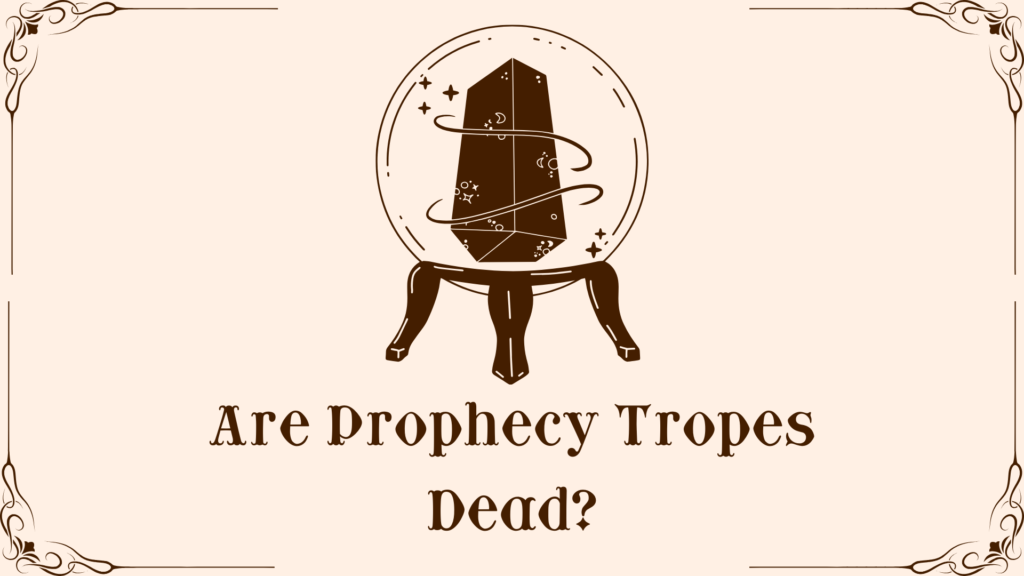
The YA fantasy genre has evolved extensively over the last twenty years. It has seen many different eras—from the magical and mythical phase of the early 2000s, with iconic series like Harry Potter and Percy Jackson, to the dystopian fantasy craze of the 2010s, and now to the meteoric rise of romantasy, each era having pushed the genre in new directions. With each transformation, more diverse authors and characters have emerged, bringing fresh perspectives and challenging long-standing tropes that many readers have come to expect—or even dread.
There are many overtly overused tropes in the genre, such as the love triangle, enemies to lovers, manic pixie dream girls, etc., which are all generally despised by readers at this point. These tropes once thrilled audiences but have since become predictable and, in some cases, irritatingly formulaic. Yet, one trope remains hotly debated—the prophecy trope.
In recent years, I have seen a decrease in “the chosen one” plotlines, where the hero may be guided towards their mission by fate and oracle-like prophecies. This trope helped to define fantasy enough to leave nostalgic marks on all of us, but the average, savvy reader has come to have expectations on this trope. When readers see a prophecy that calls for the protagonist or other main character’s death, they know that there’s always a loophole or hidden meaning that upends expectations.
While this doesn’t make every use of the prophecy trope tired, it does make them less effective in the books that we read. The magic of a prophecy lies in the tension between fate and free will, offering heroes an external goal to grapple with while also testing their agency. These tropes can be dynamic and engaging but must subvert reader expectations without feeling like the original stakes are forgotten. With each reiteration of these tropes, readers become increasingly more aware of how prophecies in fantasy are constructed. This can lead to readers being able to predict how a prophecy will be changed or recontextualised as the story continues, thus decreasing the popularity of the trope.
As a big fantasy reader, I have always appreciated a “chosen one” or prophecy storyline, which may thrust characters to the end of the narrative, forcing them to become brave, find confidence in themselves, or even tap into their legendary powers to defeat the big bad guy. I think there are many successful uses of this trope, my personal favorites including the animated show, Avatar the Last Airbender, the second book in the Shadow and Bone trilogy by Leigh Bardugo, Siege and Storm, and Brandon Sanderson’s Mistborn trilogy. But, for every great use of the trope, there are books that do not tap into the stakes of the trope or completely go against the purpose of a prophecy as the driving force of the narrative. For instance, while I think the use of the prophecies in Rick Riordan’s original Percy Jackson and the Olympians series is successful, the use of the prophecy trope in The Heroes of Olympus series, particularly in Blood of Olympus, completely falters. Blood of Olympus sets up the death of one of our main cast of characters. It is emotional and readers are forced to keep reading with the anticipation of the end, but as the prophecy begins to be fulfilled this character is seemingly saved out of nowhere. The use of prophecies in this way is tiring and can be emotionally draining for the readers who have been told one thing, only for this to be completely untrue.
Because of my personal experiences as a reader, it comes as no surprise to me that there has been a decrease of prophecy tropes in YA fantasy. I think that this trope is far less offensive and dated than some of the other tropes listed above, but this does not change the fact that it can still be a drag to read if not done with purpose or precision. I believe that romantasy will continue to flourish in the coming years, but I would not be surprised to see this trope resurface with an increase in female protagonists who may have to tap into their powers to fulfill a mission to save their world. Additionally, in the politically tense world we now live in, readers might wish to have some otherworldly prediction of a chosen one to save us all from impending doom. Reliable tropes can be a comfort, especially when our real-life future can be so unpredictable.
So how do we rekindle the prophecy trope to resonate with modern readers? Should these predictions be more nuanced, offer less subversions, or even reflect themes of uncertainty and choice in a world where fate is no longer a clear path? Let us know what you think!
Jenica Delaney, Pine Reads Review Writer